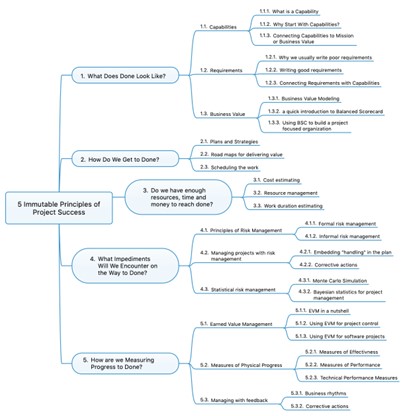ADVISORY
By Glen B. Alleman
Niwot Ridge, LLC
USA
Improving the Probability of Project Success (PoPS) starts with answering five critical questions, no matter the project domain, the context within that domain, or the method used to manage the project or develop the products or services produced by the project:
- What does done look like in units of measure meaningful to the decision-makers?
- What is the plan to arrive at Done the needed time, for the needed cost, with the needed capabilities?
- Do we have the needed resources, time, money, and facilities to arrive at Done as planned?
- What impediments will be encountered along the way to Done and their corrective and prevention plans?
- How do we know we are making progress toward Done as planned?
Asking and answering these questions guides the successful management of any project, program, and portfolio, regardless of domain, context, technology, or development method. This approach can be applied to the development of any system, no matter the business or technical domain.
Any successful method must connect projects and their deliverables with the programs that collect projects into beneficial outcomes, the portfolio of programs, and their business outcomes connected to strategy, mission, and vision. Figure 1 describes the elements of the 5 Immutable principles, their outcomes, and the artifacts from the project’s work effort.

Figure 1 – The 5 Immutable Principles needed to increase the probability of project success, the detailed processes, and the artifacts and outcomes from each process. For each principle, the subprinciples each have evidence of their outcomes.
Overview
Project managers are tasked with a wide variety of duties. Many are vague, and some are difficult, but they are only somewhat rewarding without a chance of project success. This Probability of Project Success drives many project managers to seek out new and innovative ways to Increase this probability. These 5 Immutable Principles are the basis for Increasing the Probability of Project Success.
When discussing projects, five attributes must be established before applying the five Immutable Principles. These five project attributes are:
- The Situation – projects are risky by their very nature. Handling or retiring risk is a core success factor.
- The Problem – project management makes use of processes to create measurement data. This data must identify tangible outcomes and their performance measures in units meaningful to the decision-makers.
- The Need – project management is about avoiding surprises. Measures of physical percent complete used to forecast future performance is the basis of forecasting future performance.
- The Context – organizations execute projects. Adapting the project management processes to the organization’s culture and to the risk tolerance of the project’s environment is a critical success factor.
- The Solution – defining the tangible deliverables using measures of increasing maturity in unit technical performance increases the probability of success.
Through these 5 Immutable Principles, the project manager must provide accurate and credible information to the decision-makers:
More…
To read entire article, click here
How to cite this article: Alleman, G. B. (2023). 5 Immutable Principles of Project Success, PM World Journal, Vol. XII, Issue IV, April. Available online at https://pmworldjournal.com/wp-content/uploads/2023/04/pmwj128-Apr2023-Alleman-5-Immutable-Principles-of-Project-Success.pdf
About the Author

Glen B. Alleman
Niwot Ridge, LLC
![]()
Glen B. Alleman leads the Program Planning and Controls practice for Niwot Ridge, LLC. In this position, Glen brings his 30+ years’ experience in program management, systems engineering, software development, and general management to bear on problems of performance-based program management.
Mr. Alleman’s experience ranges from real time process control systems to product development management and Program Management in a variety of firms including Logicon, TRW, CH2M Hill, SM&A, and several consulting firms before joining Niwot Ridge, LLC. Mr. Alleman’s teaching experience includes university level courses in mathematics, physics, and computer science.
Glen can be contacted at galleman@niwotridge.com









